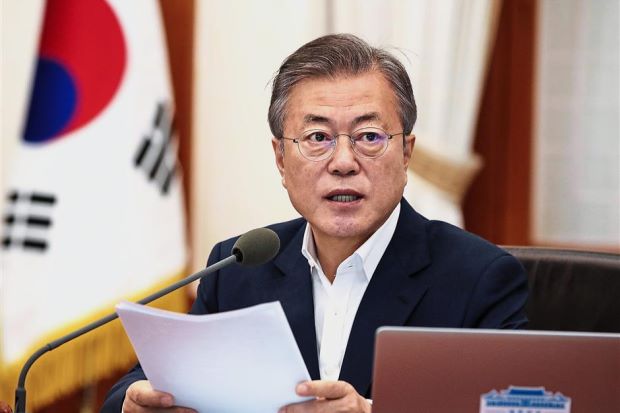 |
Not-so-nice figures: Moon has seen his popularity slide amid criticism that he’s hurting employment by aggressively increasing the minimum wage. — AP |
Unemployment and jobs growth in South Korea haven’t looked so bad since the wake of the global financial crisis, undermining President Moon Jae-in’s economic agenda.
Data released Wednesday show the unemployment rate jumping to 4.2 percent, the highest since early 2010, and much greater than any economists forecast. Jobs growth slumped to just 3,000 last month, also the worst figure in more than eight years.
Moon, who came into office pledging to create jobs and raise incomes for regular workers, has seen his popularity slide amid criticism that he’s hurting employment by aggressively increasing the minimum wage.
While pay hikes planned for this year and 2019 are here to stay, Finance Minister Kim Dong-yeon said the government would consider adjusting some policies.
He conceded that the jobs market wouldn’t improve much anytime soon.
Disappearing Jobs Growth
- : South Korea added just 3,000 jobs in August, the least since 2010
Moon’s administration points to the fallout from corporate restructuring and the shrinking working-age population as the source of the problems in the labour market. Businesses counter that hiking the minimum wage 16% this year, with another bump of almost 11% to come next year, has made job layoffs inevitable.
Small business owners in particular, from convenience stores to fast-food franchises, have shed workers.
Adding to the economic unease in South Korea is the risk that US President Donald Trump may hit car exporters with auto tariffs, even after Seoul agreed to renegotiate its trade deal with the US.
Unemployment Spike
South Korea's unemployment rate in August reached the highest since 2010
Source: Statistics Korea
South Korean bonds climbed and the won fell after jobs figures, which appeared to squash any near-term prospect of the central bank raising interest rates.
The finance minister said economic policies that are geared toward wage-based growth are moving in the “right direction”. Yet the government also acknowledged the need for more communication and market analysis in order to gain trust from companies and the people, he said.
The presidential office described the recent increase in unemployment as inevitable pain that accompanies a change in the structure of the economy, Yonhap News reported.
Like many other countries, South Korea is experiencing a widening gap between the rich and the poor. It’s confounding policy makers and exacerbating political divisions. — Bloomberg
Getting Richer. Getting Poorer
Change in income for the most wealthy and the least wealthy households
Source: Statistics Korea. Quarterly figures, measures versus year earlier
Related: China Is Not America’s Next Great Enemy
Related posts:
5,000 Malaysians are illegals in South Korea, lured by higher pay, living underground !
South Korea can’t tackle new Trump Order alone, be prepared new Trump order !
Youth unemployment hit record high in 2017: MIDF Research
Corruptions, Conflict of interests, politicians and Malaysian bloated civil service
Malaysia's low wages: low-skilled, low productivity, low quality, reliance on cheap foreign workers! Need to manage!
Be ready – financial crisis is near
 |
| Prepare Now for the Next Financial Crisis |






No comments:
Post a Comment